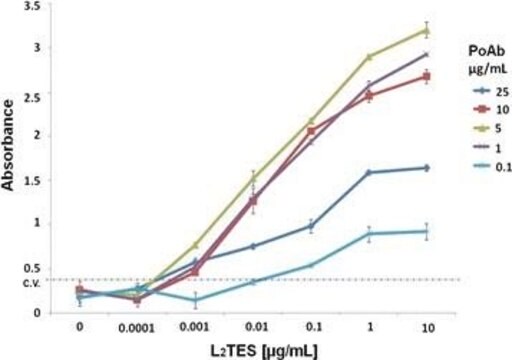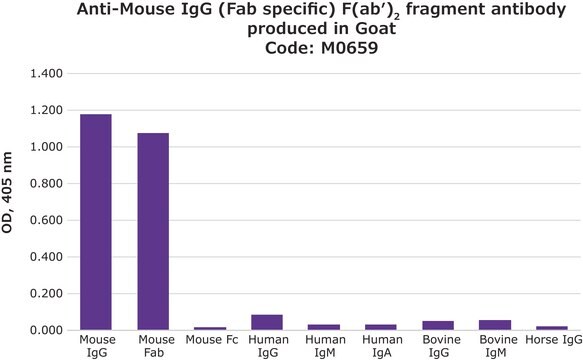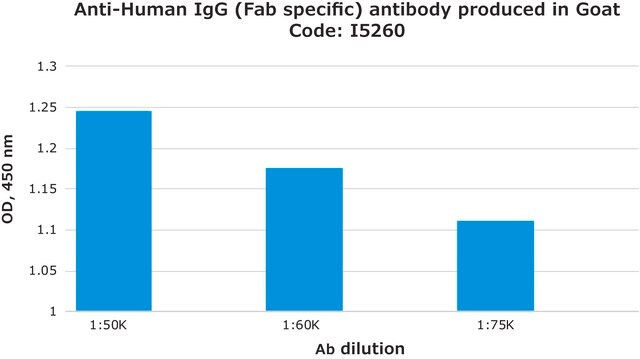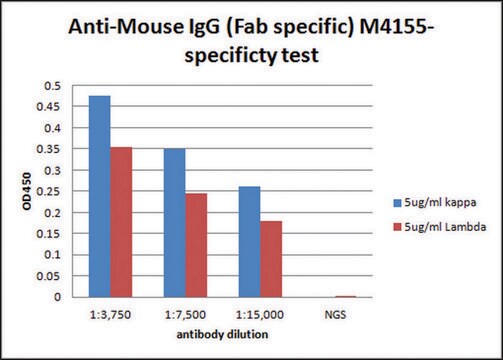M0284
Anti-Mouse IgG (Fc specific) F(ab′)2 fragment antibody produced in goat
2.0 mg/mL, affinity isolated antibody, buffered aqueous solution
Autenticatiper visualizzare i prezzi riservati alla tua organizzazione & contrattuali
About This Item
Prodotti consigliati
Origine biologica
goat
Livello qualitativo
Coniugato
unconjugated
Forma dell’anticorpo
affinity isolated antibody
Tipo di anticorpo
secondary antibodies
Clone
polyclonal
Stato
buffered aqueous solution
Concentrazione
2.0 mg/mL
tecniche
indirect ELISA: suitable
Condizioni di spedizione
dry ice
Temperatura di conservazione
−20°C
modifica post-traduzionali bersaglio
unmodified
Descrizione generale
Immunoglobulin G (IgG) belongs to the immunoglobulin family and is a widely expressed serum antibody. An immunoglobulin has two heavy chains and two light chains connected by a disulfide bond.It mainly helps in immune defense. It is a glycoprotein.IgG is a major class of immunoglobulin.Mouse consists of five immunoglobulin classes- IgM, IgG, IgA, IgD and IgE. Mouse IgG is further divided into five classes- IgG1, IgG2a, IgG2b and IgG3.
Immunoglobulin G (IgG) is a glycoprotein antibody that regulates immune responses such as phagocytosis and is also involved in the development of autoimmune diseases . Mouse IgGs have four distinct isotypes, namely, IgG1, IgG2a, IgG2b, and IgG3. IgG1 regulates complement fixation in mice .
Immunogeno
Purified mouse IgG
Applicazioni
Anti-Mouse IgG (Fc specific) F(ab′)2 fragment antibody produced in goat has been used in CD117/Sca-1 fluorescence-activated cell sorting (FACS) analysis and to detect bound factor H in factor H binding assay.
Azioni biochim/fisiol
Immunoglobulin G (IgG) participates in hypersensitivity type II and type III reactions. IgG helps in opsonization, complement fixation and antibody dependent cell mediated cytotoxicity.
Altre note
Antibody adsorbed with bovine, equine and human serum proteins
Stato fisico
Solution in 0.01 M phosphate buffered saline, pH 7.4, containing 0.05% sodium azide.
Nota sulla preparazione
Adsorbed to reduce background with bovine, equine, or human samples.
Useful when trying to avoid background staining due to the presence of Fc receptors.
Useful when trying to avoid background staining due to the presence of Fc receptors.
Esclusione di responsabilità
Unless otherwise stated in our catalog or other company documentation accompanying the product(s), our products are intended for research use only and are not to be used for any other purpose, which includes but is not limited to, unauthorized commercial uses, in vitro diagnostic uses, ex vivo or in vivo therapeutic uses or any type of consumption or application to humans or animals.
Non trovi il prodotto giusto?
Prova il nostro Motore di ricerca dei prodotti.
Codice della classe di stoccaggio
12 - Non Combustible Liquids
Classe di pericolosità dell'acqua (WGK)
nwg
Punto d’infiammabilità (°F)
Not applicable
Punto d’infiammabilità (°C)
Not applicable
Scegli una delle versioni più recenti:
Possiedi già questo prodotto?
I documenti relativi ai prodotti acquistati recentemente sono disponibili nell’Archivio dei documenti.
The Laboratory Rat (1998)
Liliana Grajales et al.
Journal of molecular and cellular cardiology, 48(4), 735-745 (2010-01-12)
Bone marrow-derived mesenchymal stem cells (BM-MSCs) can be induced to differentiate into myogenic cells. Despite their potential, previous studies have not been successful in producing a high percentage of cardiac-like cells with a muscle phenotype. We hypothesized that cardiac lineage
Producing an Anti-β2 Integrin MAb By a Hybridoma Cell Line in a 2-Liter Stirred-Tank Bioreactor.
Kallel, H, and Fathallah, D, M.
Bioprocess International, 1, 54-59 (2003)
The Immunoglobulins: Structure and Function (1998)
Delayed enrichment of mesenchymal cells promotes cardiac lineage and calcium transient development
Grajales L, et al.
Journal of Molecular and Cellular Cardiology, 48(4), 735-745 (2010)
Il team dei nostri ricercatori vanta grande esperienza in tutte le aree della ricerca quali Life Science, scienza dei materiali, sintesi chimica, cromatografia, discipline analitiche, ecc..
Contatta l'Assistenza Tecnica.








